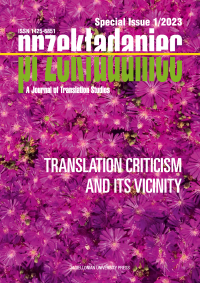Translation Criticism in Cyberspace – New Opportunities and Challenges (on Polish Translations of Mikhail Bulgakov’s The Master and Margarita)
Translation Criticism in Cyberspace – New Opportunities and Challenges (on Polish Translations of Mikhail Bulgakov’s The Master and Margarita)
Author(s): Kinga RozwadowskaSubject(s): Translation Studies
Published by: Wydawnictwo Uniwersytetu Jagiellońskiego
Keywords: translation criticism; The Master and Margarita; retranslations; online journals;
Summary/Abstract: The ongoing digitization of our literary heritage, together with growing competition between publishing houses has led to a situation where the retranslations of works considered canonical have changed their form of extending from diachronic, linear development in time to a synchronic “explosion” of parallel texts, whose task is to win over readers/consumers with their individual novelty, distinctiveness and “inventiveness.” In fact, such translations gain a new function – they become a marketing tool for publishing houses. In my opinion the newest retranslations of Mikhail Bulgakov’s The Master and Margarita is one of the most interesting examples of the process described above. In recent years, new Polish versions of this novel have been published at a dizzying pace (five new translations between 2015 and 2018) and in overwhelming numbers (five editions were published in four different translations in 2018 alone). These new translations of Bulgakov’s novel have evoked a lively response from readers. All sorts of analysis, comparisons and opinions have been published not only in scholarly journals, but also in daily newspapers, internet forums and in comments on online bookstores. On the internet, professional translation criticism coexists with the personal opinions of internet users (often based on non-literary factors) and with marketing content, advertisements, and blurbs deliberately made to look like reviews. In this article I would like to discuss the new roles of professional translation criticism under the circumstances described above, analyse its presence on the internet and try to define its new objectives. On the one hand, its voice should be loud and clear enough to be heard within the virtual chaos of texts, whilst on the other hand it should be persuasive and lucid enough to assist readers with their decision-making regarding a particular translation and to perceive the literary value of texts hidden behind attractive covers of new editions.
Journal: Przekładaniec.
- Issue Year: 2023
- Issue No: Sp. Iss.
- Page Range: 97-113
- Page Count: 17
- Language: English

